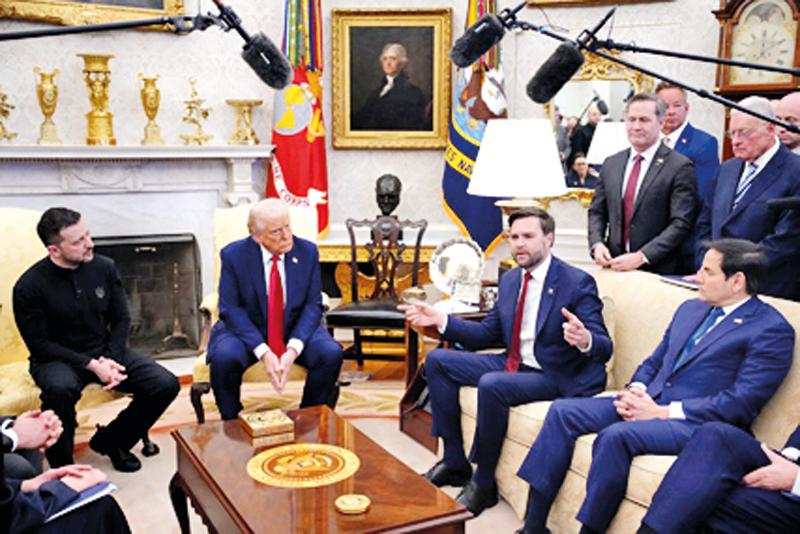

On February 28, 2025, the Oval Office became the epicentre of a diplomatic confrontation that has since dominated global headlines. U.S. President Donald Trump and Ukrainian President Volodymyr Zelensky engaged in a heated exchange that not only strained bilateral relations but also raised concerns about the future of international alliances and the ongoing conflict in Eastern Europe.
 Prelude to the Meeting
Prelude to the Meeting
The anticipation surrounding President Zelensky’s visit to Washington was palpable. The agenda included discussions on a proposed minerals deal, which aimed to grant the U.S. access to Ukraine’s rare earth elements, and deliberations on strategies to counter Russian aggression. However, underlying tensions were evident, especially given President Trump’s recent remarks labelling Zelensky a “dictator,” a comment he refrained from repeating just a day before their meeting.
The Oval Office Confrontation
The meeting, initially expected to be a formal diplomatic engagement, quickly devolved into a public spectacle of discord. In front of assembled media, President Trump and Vice President JD Vance accused President Zelensky of insufficient gratitude for U.S. support. President Trump asserted, “You’re gambling with the lives of millions of people. You’re gambling with World War III,” emphasizing his perception of President Zelensky’s reluctance to pursue peace with Russia. Vice President Vance further chastised President Zelensky, stating, “You’re not acting all that thankful.”
The confrontation escalated when discussions veered toward the proposed minerals deal. President Zelensky, influenced by prior consultations with anti-Trump Democrats, rejected the deal, citing concerns over inadequate security assurances for Ukraine. This rejection was met with visible frustration from President Trump, who viewed the agreement as pivotal for both economic and strategic reasons.
Abrupt Conclusion and Immediate Aftermath
The escalating tensions culminated in an unprecedented move: President Trump ordered the termination of the meeting and directed President Zelensky to leave the White House. A planned joint press conference was cancelled, and the anticipated signing of the minerals agreement was shelved. President Trump later commented on social media, stating that President Zelensky could return “when he is ready for peace.”
In response, President Zelensky expressed gratitude for past U.S. support but refrained from issuing an apology. He remarked, “I respect the President and I respect American people,” while acknowledging that the confrontation was “not good” but expressing hope for future collaboration.
Global Reactions
The international community reacted swiftly to the Oval Office incident. European leaders, alarmed by the potential implications for regional security, convened emergency meetings to address the fallout. The United Kingdom and France initiated efforts to mediate and salvage the minerals agreement, emphasizing the importance of maintaining a united front against Russian aggression.
Media outlets worldwide provided extensive coverage of the incident. CNN highlighted the unprecedented nature of the confrontation, noting that “never before has an American President berated his visitor like Trump did to Zelensky.” The Guardian described the meeting as “one of the greatest diplomatic disasters in modern history,” underscoring the potential long-term ramifications for U.S.-Ukraine relations.
Analysis and Implications
Experts in international diplomacy and negotiation have scrutinized the events of February 28. The abrupt breakdown of talks has been attributed to a clash of priorities: President Trump prioritized swift economic agreements and a broader rapprochement with Russia, while President Zelensky sought concrete security guarantees for Ukraine. This divergence led to a public confrontation that has now complicated future negotiations.
The incident has also sparked debates about the direction of U.S. foreign policy. Critics argue that the administration’s approach signals a retreat from traditional alliances and a potential realignment favouring authoritarian regimes. The public nature of the dispute has raised concerns about the effectiveness of the current U.S. diplomatic strategy and its implications for global stability.
Looking Ahead
The Oval Office clash between Presidents Trump and Zelensky marks a significant turning point in U.S.-Ukraine relations. The immediate cessation of talks and the public nature of the disagreement have introduced new uncertainties in the geopolitical landscape. As European nations step in to mediate and as Ukraine seeks to bolster its defences against ongoing threats, the international community watches closely, understanding that the repercussions of this incident may influence diplomatic engagements and alliances for years to come.
In the aftermath, the resilience of diplomatic channels will be tested. The ability of leaders to navigate personal disagreements and prioritize global stability remains crucial. The world now waits to see if the strained relationship between the U.S. and Ukraine can be mended or if this incident will usher in a new era of geopolitical realignments.










